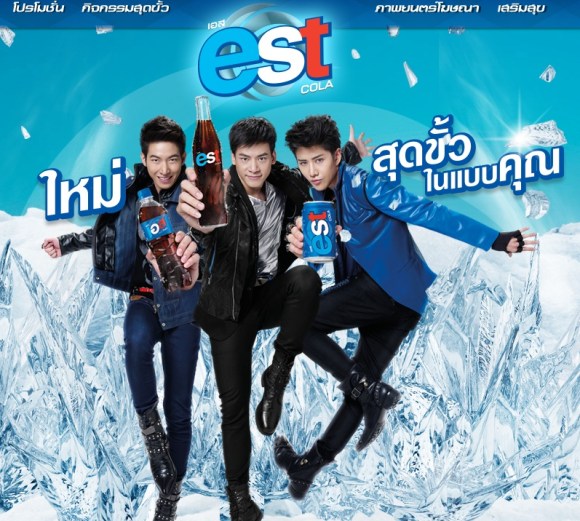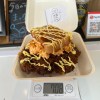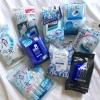
On 31 October, the long-standing 59-year partnership between Pepsi Co and Thailand’s leading bottling company Serm Suk came to a close. As a result, Serm Suk launched a surprise cola blitz on the competition with a 300 million baht (US$9.8M) campaign for their own “est Cola”.
Since 2 November est Cola has set up strongholds in most major supermarkets and convenience stores across the nation. Also, in the short span of a month they were able to breach into what is considered by cola military analysts as the key position for victory – fast food soda fountain machines.
Serm Suk’s minister of propaganda declared: “This is a historic change for us. We already have a circulation of more than 200,000 dealers throughout the country already. Survey results have revealed 77% of consumers like est Cola.”
The product’s name is pronounced “S-Cola” and was chosen because it was easy to remember. The name is also shared with the superlative suffix “est”, and is said to invoke images of superiority over their enemies.
The cola is also available in a wide range of packaging, including 5 types of 355mL cans, two types of glass bottles and three types of plastic bottles. Strangely, there is a 455mL (15oz) plastic bottle version sold for 12bahts (US$0.39), yet there is a 480mL (16oz) bottle exclusive to 7-11 for 15bahts (US$0.49).
By my math, that seems to be an odd marketing tactic. Then again, I’m not a major bottler in Thailand. Perhaps this is a gambit to confuse their enemies.
Meanwhile, Pepsi has signed with another Thai bottler, International Refreshments, and are preparing a counterattack. Other market leaders, Coca-Cola and Kola Real (aka Big Cola in Thailand) have stayed low.
Big Cola is expected to suffer heavy losses in this initial campaign. Serm Suk is adamant on claiming a quarter of the nation’s cola market next year. Although they would prefer to carve that market share from Coke and Pepsi, the two soda giants have seen battle before.
The likely scenario – without the interference of other snack related businesses – is the near annihilation of Big Cola. Thailand’s hip carbonated tea brand, Chakuza, is claiming neutrality.
However if fate plays its hand, 2013 will undoubtedly be a violent year of turmoil for the carbonated beverage industry in Thailand. The Red Cross is setting up refugee camps in neighboring countries equipped to help those afflicted with stomachaches and type 2 diabetes.
Source: est (Thai) via Bangkok Post (English), Bangkok Keizai (Japanese)
▼ Serm Suk have enlisted and formed a pop super-group of Pakin ‘‘Tono’’ Kumwilaisuk, Sukrit ‘‘Bee’’ Wisetkaew, and Pirat ‘‘Mike’’ Nitipaisalkul to aid in their propaghanda campaign.

 Coca-Cola to release their healthiest cola ever in Japan this March
Coca-Cola to release their healthiest cola ever in Japan this March Pepsi Japan to release its “most refreshing” cola ever
Pepsi Japan to release its “most refreshing” cola ever Japanese candy maker announces new “hot cola gum” to meet demand that probably doesn’t exist
Japanese candy maker announces new “hot cola gum” to meet demand that probably doesn’t exist Pepsi releases a new cola in Japan specifically for karaage fried chicken
Pepsi releases a new cola in Japan specifically for karaage fried chicken Cute d’état! Thousands of ducks take to the streets in Thailand
Cute d’état! Thousands of ducks take to the streets in Thailand Foreigner’s request for help in Tokyo makes us sad for the state of society
Foreigner’s request for help in Tokyo makes us sad for the state of society Japanese city loses residents’ personal data, which was on paper being transported on a windy day
Japanese city loses residents’ personal data, which was on paper being transported on a windy day Ghibli Park now selling “Grilled Frogs” from food cart in Valley of Witches
Ghibli Park now selling “Grilled Frogs” from food cart in Valley of Witches Osaka governor suggests lowering voting age to 0 to curb population decline
Osaka governor suggests lowering voting age to 0 to curb population decline Sandwiches fit for a sumo served up in Osaka【Taste Test】
Sandwiches fit for a sumo served up in Osaka【Taste Test】 Japan’s cooling body wipe sheets want to help you beat the heat, but which work and which don’t?
Japan’s cooling body wipe sheets want to help you beat the heat, but which work and which don’t? Harajuku Station’s beautiful old wooden building is set to return, with a new complex around it
Harajuku Station’s beautiful old wooden building is set to return, with a new complex around it Historical figures get manga makeovers from artists of Spy x Family, My Hero Academia and more
Historical figures get manga makeovers from artists of Spy x Family, My Hero Academia and more Beautiful Red and Blue Star luxury trains set to be Japan’s new Hokkaido travel stars
Beautiful Red and Blue Star luxury trains set to be Japan’s new Hokkaido travel stars Smash Bros. director Sakurai stabs Kirby in the face, has delicious justification for it
Smash Bros. director Sakurai stabs Kirby in the face, has delicious justification for it McDonald’s new Happy Meals offer up cute and practical Sanrio lifestyle goods
McDonald’s new Happy Meals offer up cute and practical Sanrio lifestyle goods Japanese ramen restaurants under pressure from new yen banknotes
Japanese ramen restaurants under pressure from new yen banknotes French Fries Bread in Tokyo’s Shibuya becomes a hit on social media
French Fries Bread in Tokyo’s Shibuya becomes a hit on social media Studio Ghibli releases new action figures featuring Nausicaä of the Valley of the Wind characters
Studio Ghibli releases new action figures featuring Nausicaä of the Valley of the Wind characters New private rooms on Tokaido Shinkansen change the way we travel from Tokyo to Kyoto
New private rooms on Tokaido Shinkansen change the way we travel from Tokyo to Kyoto Red light district sushi restaurant in Tokyo shows us just how wrong we were about it
Red light district sushi restaurant in Tokyo shows us just how wrong we were about it Tokyo Tsukiji fish market site to be redeveloped with 50,000-seat stadium, hotel, shopping center
Tokyo Tsukiji fish market site to be redeveloped with 50,000-seat stadium, hotel, shopping center All-you-can-drink Starbucks and amazing views part of Tokyo’s new 170 meter-high sky lounge
All-you-can-drink Starbucks and amazing views part of Tokyo’s new 170 meter-high sky lounge Beautiful Ghibli sealing wax kits let you create accessories and elegant letter decorations【Pics】
Beautiful Ghibli sealing wax kits let you create accessories and elegant letter decorations【Pics】 Studio Ghibli releases Kiki’s Delivery Service chocolate cake pouches in Japan
Studio Ghibli releases Kiki’s Delivery Service chocolate cake pouches in Japan New definition of “Japanese whiskey” goes into effect to prevent fakes from fooling overseas buyers
New definition of “Japanese whiskey” goes into effect to prevent fakes from fooling overseas buyers Our Japanese reporter visits Costco in the U.S., finds super American and very Japanese things
Our Japanese reporter visits Costco in the U.S., finds super American and very Japanese things Studio Ghibli unveils Mother’s Day gift set that captures the love in My Neighbour Totoro
Studio Ghibli unveils Mother’s Day gift set that captures the love in My Neighbour Totoro More foreign tourists than ever before in history visited Japan last month
More foreign tourists than ever before in history visited Japan last month New Pokémon cakes let you eat your way through Pikachu and all the Eevee evolutions
New Pokémon cakes let you eat your way through Pikachu and all the Eevee evolutions Sales of Japan’s most convenient train ticket/shopping payment cards suspended indefinitely
Sales of Japan’s most convenient train ticket/shopping payment cards suspended indefinitely Sold-out Studio Ghibli desktop humidifiers are back so Totoro can help you through the dry season
Sold-out Studio Ghibli desktop humidifiers are back so Totoro can help you through the dry season Japanese government to make first change to romanization spelling rules since the 1950s
Japanese government to make first change to romanization spelling rules since the 1950s Ghibli founders Toshio Suzuki and Hayao Miyazaki contribute to Japanese whisky Totoro label design
Ghibli founders Toshio Suzuki and Hayao Miyazaki contribute to Japanese whisky Totoro label design Doraemon found buried at sea as scene from 1993 anime becomes real life【Photos】
Doraemon found buried at sea as scene from 1993 anime becomes real life【Photos】 Tokyo’s most famous Starbucks is closed
Tokyo’s most famous Starbucks is closed One Piece characters’ nationalities revealed, but fans have mixed opinions
One Piece characters’ nationalities revealed, but fans have mixed opinions We asked a Uniqlo employee what four things we should buy and their suggestions didn’t disappoint
We asked a Uniqlo employee what four things we should buy and their suggestions didn’t disappoint Princesses, fruits, and blacksmiths: Study reveals the 30 most unusual family names in Japan
Princesses, fruits, and blacksmiths: Study reveals the 30 most unusual family names in Japan Mint Pepsi for Yakisoba is coming to Japan, and we got to taste it before it goes on sale
Mint Pepsi for Yakisoba is coming to Japan, and we got to taste it before it goes on sale What’s the best (and worst) cola in the world according to our Japanese writer?
What’s the best (and worst) cola in the world according to our Japanese writer? “Brazilian” coffee cola released in Japan
“Brazilian” coffee cola released in Japan Pepsi releases a new cola in Japan specifically for zangi
Pepsi releases a new cola in Japan specifically for zangi The Japan-exclusive Pepsi for fried chicken is here, but is it good?【Taste test】
The Japan-exclusive Pepsi for fried chicken is here, but is it good?【Taste test】 Kanazawa Curry Cola lets you have your fried pork and curry on the go!
Kanazawa Curry Cola lets you have your fried pork and curry on the go! Suntory releases new Pepsi soft drinks only available in Japan
Suntory releases new Pepsi soft drinks only available in Japan Christmas cake-flavored Pepsi is set to make the holidays a little sweeter in Japan
Christmas cake-flavored Pepsi is set to make the holidays a little sweeter in Japan Pepsi’s new Japan Cola has a special ingredient: one of Japan’s most delicious sweets seasonings
Pepsi’s new Japan Cola has a special ingredient: one of Japan’s most delicious sweets seasonings Pepsi creates a new cola for Christmas fried chicken in Japan
Pepsi creates a new cola for Christmas fried chicken in Japan Pepsi Japan teases new limited-edition flavour with clever marketing
Pepsi Japan teases new limited-edition flavour with clever marketing New “Sleep Water” from Coca Cola Japan promises to help you drift off, wake up refreshed
New “Sleep Water” from Coca Cola Japan promises to help you drift off, wake up refreshed Man hospitalizes himself after gorging on cup ramen and cola
Man hospitalizes himself after gorging on cup ramen and cola Are transparent drinks actually revealing “Japan’s dark side?”
Are transparent drinks actually revealing “Japan’s dark side?” Rare photos from inside North Korea’s mysterious buildings
Rare photos from inside North Korea’s mysterious buildings
Leave a Reply